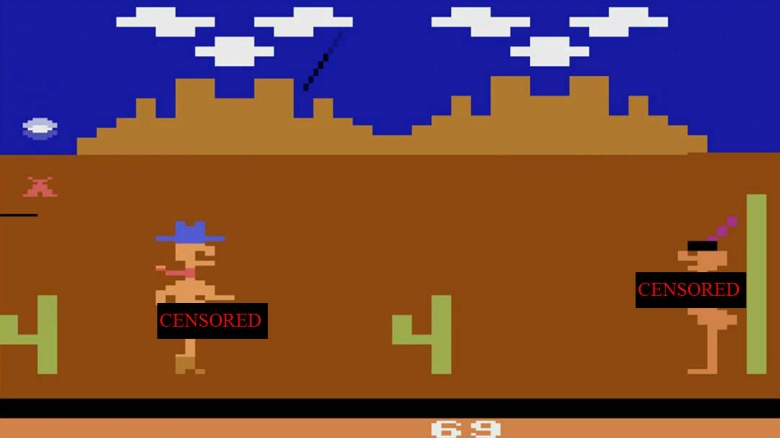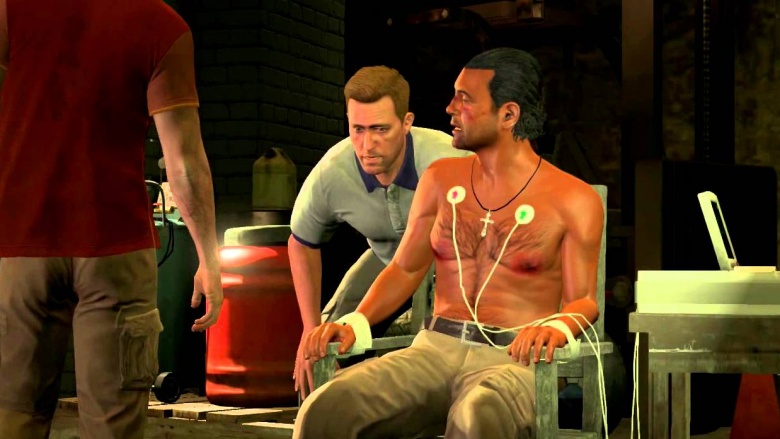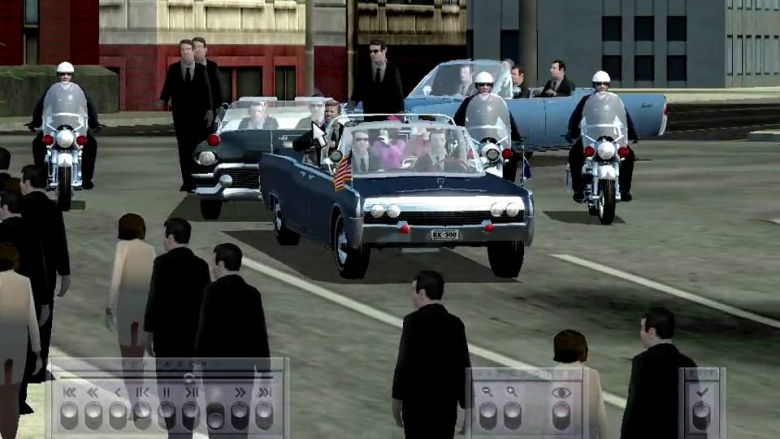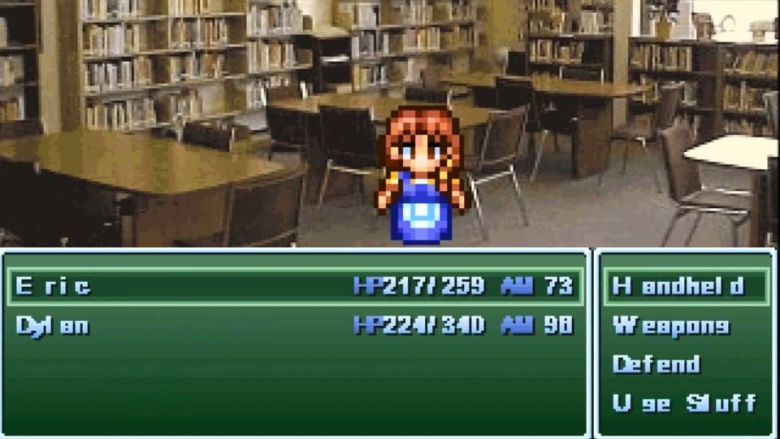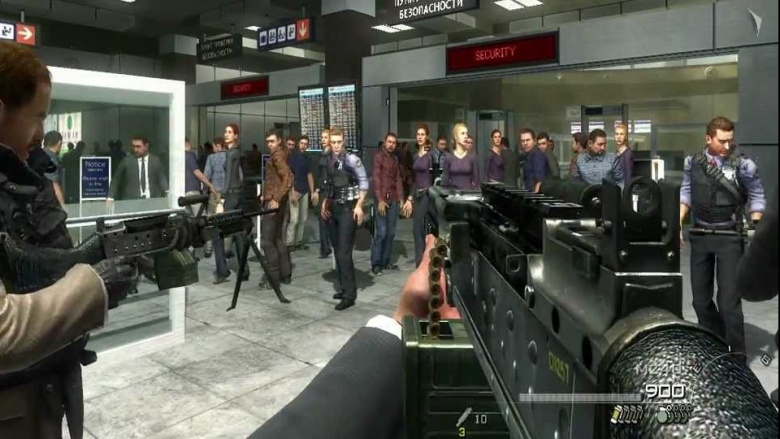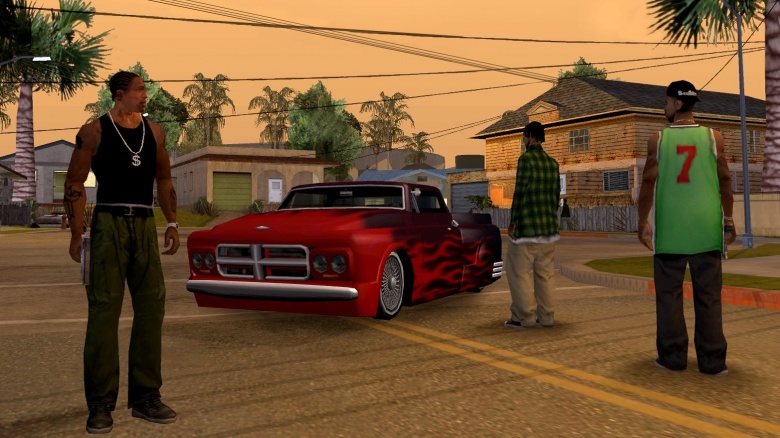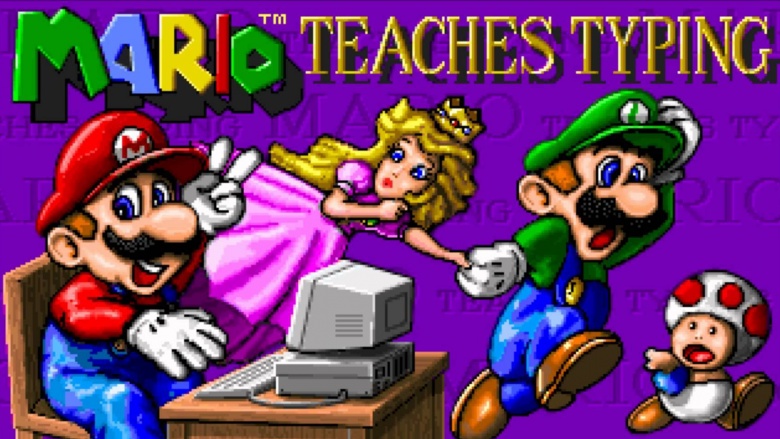Video Games That Went Way Too Far
Video games have certainly attracted controversy during their comparatively brief time in the entertainment spotlight. Ever since the first 13-year-old saw Sub Zero perform a fatality, the depiction of violence in video games became a hot-button issue. Most gamers shrug off such controversy. Yet, there are a few times that games pushed the boundaries of good taste too far. Here are a few examples...
Custer's Revenge
The Atari 2600, shockingly, had its share of adult video games. That is, if blocky, pixelated graphics can truly be classified as "adult." Eroticism goes down the toilet once you realize that you can't distinguish a human body from a palm tree. Notable among these games is Custer's Revenge. In the game, you get to play as a nude General Armstrong Custer—you know, the military leader who, along with his troops, perished against an overwhelming force of Native Americans at the Battle of Little Bighorn in 1876. In the game, you must navigate an inexplicably reincarnated Custer across the screen, dodging arrows, all to get to a nude Native American woman who's tied to a pole. Custer then gets his titular revenge by, well, sexually assaulting the woman. Simply put, the word "offensive" doesn't even begin to describe Custer's Revenge. And here we thought that E.T. the Extra-Terrestrial was the worst game on the Atari 2600.
Torture Scene in Grand Theft Auto V
The Grand Theft Auto series is no stranger to controversy. Most of the violence, however, is too cartoonish to really be that shocking. That said, even it's hard not to think the series' developer, Rockstar, went to a bit too far with the torture scene in Grand Theft Auto V. In the mission, "By the Book," the player controls Trevor—a psychopathic methhead—who proceeds to torture a man by waterboarding him, ripping out his teeth with pliers, and shocking him with a car battery. If Rockstar's goal with this scene was to showcase the horrors of torture, then they certainly succeeded. If it was to create a fun moment of gameplay...maybe not so much.
JFK: Reloaded
In 2004, Traffic Software released an first-person shooter called JFK: Reloaded. You can already probably guess where it goes from there. As you'd suspect from the title, the game allows the player to reenact the the 1963 assassination of President John F. Kennedy by controlling his alleged killer, Lee Harvey Oswald. You get more points for how closely your shots match the historical assassination. Traffic Software claimed that it was attempting to educate players by creating a historically-accurate depiction of the assassination. Others felt the game simply glorified the tragic presidential assassination. If you really want to learn about JFK's death, then read a book or visit the museum in Dallas, Texas. Video game recreations shouldn't even be on your list.
Super Columbine Massacre RPG!
Documentary filmmaker Danny Ledonne created Super Columbine Massacre RPG! with the program RPG Maker. The game attracted significant controversy after he released it in 2005. In it, you control the shooters Eric Harris and Dylan Klebold during the day of the infamous massacre. Ledonne combined characters and gameplay reminiscent of 16-bit RPGs like Chrono Trigger with photographs of the real Columbine High School in Littleton, Colorado. Ledonne said his goal was to create a documentary of sorts in video game form. But many people saw it merely as an exercise in bad taste. Considering the title and its punctuation alone, it's tough to disagree with his critics.
Airport Massacre in Call of Duty: Modern Warfare 2
In 2009's Call of Duty: Modern Warfare 2, you control of an undercover CIA operative who infiltrates a cell of Russian terrorists. During the "No Russian" mission, you accompany the terrorist group on a mission to gun down innocent civilians in an airport. The game doesn't force you to actually shoot anyone during this mission (although you can), but the scene is nevertheless extremely disturbing. It's even more upsetting years later given the high-profile terrorist incidents in western Europe and elsewhere. A lot of the other incidents on this list are from indie developers clearly looking for attention through shock value. But Call of Duty is made by Activision, one of the world's biggest game publishers. They should probably have known better.
Hot Coffee Mod in Grand Theft Auto: San Andreas
If you've been playing video games for any amount of time, then you probably recall the controversy surrounding Rockstar's 2004 game, Grand Theft Auto: San Andreas. The term "Hot Coffee mod" refers to a hidden mini-game that allowed the player to control the main character, Carl "CJ" Johnson, during sex scenes with various women. By "sex scene" we mean two crudely-animated, polygonal character models rubbing against one another. Sexy, right? Players could only access the mini-game through the use of hacking tools. Nevertheless, its presence in the game's code caused the Entertainment Software Ratings Board to slap Grand Theft Auto: San Andreas with its sales-killing "Adults Only" rating. Rockstar chose to go back, remove the offending code, and re-release the game to get the "Mature" rating reinstated. The whole thing would be funny in restrospect if it weren't for how much negative publicity the entire video game industry received as a result. Of course, compared with the next and final entry on this list, the rest of these incidents pale in comparison in terms of crossing the line.
Mario Teaches Typing
There is perhaps no series more offensive as the two Mario Teaches Typing games for the PC. These "edutainment" games were an unholy alliance between Nintendo and Interplay in the 1990s. Seriously, could they have chosen a poorer educator? We question the communication skills of anyone who often exclaims "It's-a me Mario!" Also, how can he type with any precision while wearing those white gloves? A good teacher for kids? He constantly eats mushrooms and can't even prevent his girlfriend from getting kidnapped. And when was the last time you looked for typing lessons from a plumber? The answer is "never."

